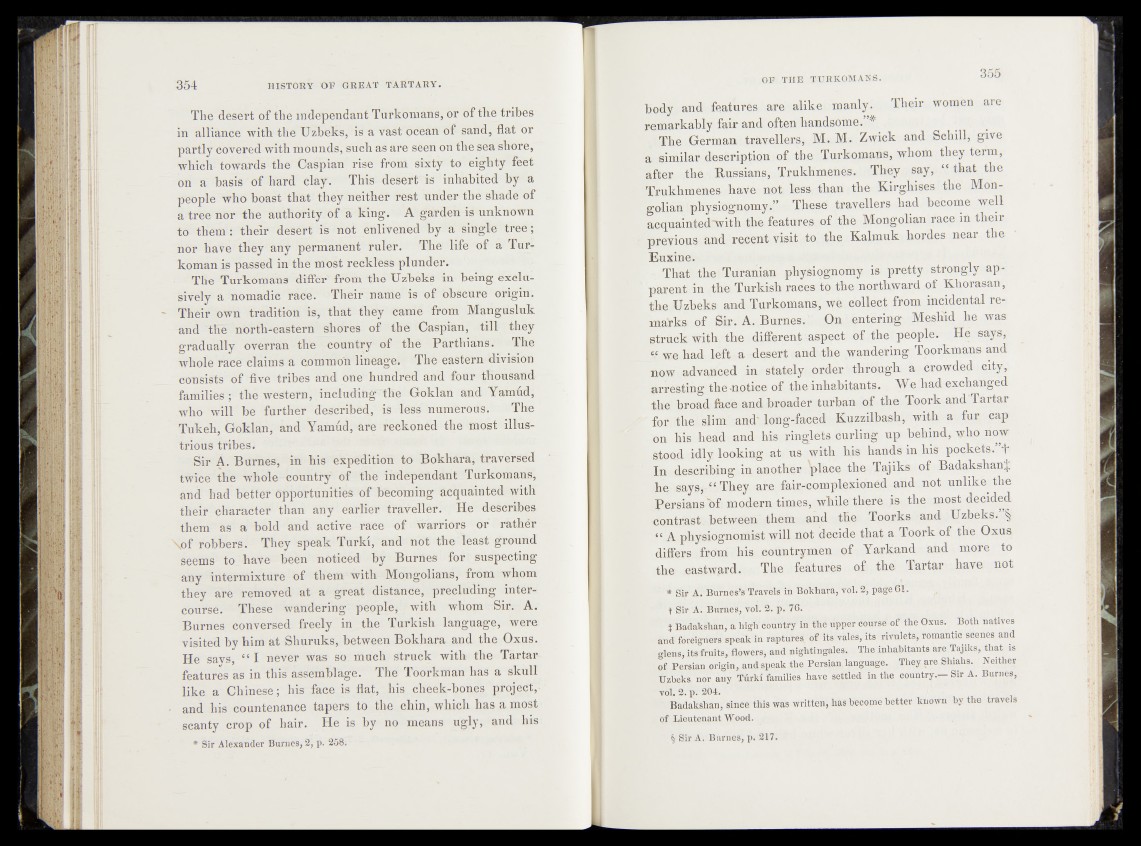
The desert of the indépendant Turkomans, or of the tribes
in alîiànce with the Uzbeks, is a vast'oé^n dfrsail'd, flat or
partly covered with mounds, such as être seen on the sea shore,
which towards the Caspian’ rise’ from sixty to1 eighty feet
a basis of hard clay. This-deserf is inhabited'by a
people who boast that they neither rest under the shade- of
a tree nor the authority of a king. A garden is unknown
to them : their desert is not enlivened by a singtè^treëi
nor have they any permanent ruler. The lifé 'of à Turkoman
is passed in the most reckless plunder.
The Turkomans differ" from the Uzbeks in-being exclusively
a nomadic race. Their name' is of obscure ofeigin.
Their own tradition is, that they camé from Maiigusluk
-atid Hio 'north-eastern shores of the Caspian, tilkiéhêy
gradually overran the country of the Parthians. The
whole race claims a common linèage; The eastern’division
consists of five ’tribes and one hundred' and four thousand
families ; the western, includiugThot Goklan and Yam4d,
who will be further described, is less aiumeroué-.b The
Tukeli, Goklan, and Yamud, are reckoneidhe^inbstglus-
'tfidus
Sir A. Burnes, in his expédition to Bokhara, traversed
twice2 the whole--country of thh-;'indépendant Turkomans^
àhd had better opportunities o f fecomihg âd^uâintedgwith
their character than any earlier traveller. He describes
them as a bold and active race of warriors or ràthdr
yjf robbers.r They speak Turki, and not the least ground
seems to have been noticed by Burnes for suspecting
any intermixture of them with- Mongolians, from whom
they are removed at a great distance, precluding dater-,
course. These wandering- people, with whom Sir. A.
Burnes conversed freely in the Turkish language, were
visited by him at Shuruks, between Bokhara and the Oxus.
He says, “ I never was so much struck with the Tartar
features as in this assemblage. The Toorkman has a skull
like a Chinese; his face is flat, his cheek-bones project,-
and his countenance tapers to the chin, which has a most
. scanty crop of hair. He is by no means ugly, and his
* Sir Alexander Burnes, 2', p. 258; -
OF THE TURKOMANS.
body and features are alikes,manly.’ | Their women are
remarkably fair and often handsome.”* : 1 V A
The German travellers, M. M.. Zwick and Schill, give
a similar description of the Turkomans, whom they term,
after the Russian^, Trukhmenes. They , say, “ that the
Trukhmenes have.not less,.than the Kirghises the Mongolian
physiognomy;^ These travellers had become well
acquaintedrwith the featurescQf Mongolianrace in their
previous and rqeent visit to :fhe Kalmuk hordes near the
Buxine.
That the Turanian physiognomy is pretty strongly apparent
in the Turkish races'.'to the northward of Khorasan,
the Uzbeks' and Turkomans, we collect from incidental remarks
of. Sir. A. Burnes.! On entering M e ^ d he was
struck with, the different aspect of the people. -He «ays,
we had left a desert and the wandering Toorkmans and
now advanced in stately .order ’ through., a crowded city,
arresting the notice of the inhabitants. We.had exchanged
the broad fe.ce and broader^urban of the Toork and'Tartar
^ fbr.-theiblim and' ldng-,feced Kuzzilbash, with a fur cap
on his head and bis^ringlets,curling up behind, who now
stood idly looking at .us with his hands in his pockets ”b
In describing in another )place the Tajiks of BadakshanJ
he says^^They are fair-complexioned and not unlike the
Persians of modern timesj whfle5there js the niost decided
contrast, between them and the. Toorks and Uzbeks..
“ A physiognomist will not decide that a Toork of the Oxus
differs from his countrymen „of Yarkand and more to
the eastward. The features of the Tartar have not
' * Sir A. Burnes’s Travels in Bokhara,'vol. 2, page 61.
t Sir A. Burnes, vdT. 2. p. 76.
t Badakshan, a liigli1 country in' the npjier course" of'lhe Oxus: Both natives
and foreigners1 speak in raptures; of its vales, it s «rivulets, romantic scenes and
glens, its fruits, flowers, and nightingales. The inhabitants are. Tajiks, that is
of Persian origin, and apeak the Persian.language. They are Shiahs. Ndther
tJjzbeks nor any Turk! families have settled in the country.— Sir A. Burnes,
vol. 2. p. 204. /
‘ Badakshan, since this was written, has become better known hy the travels
tjf Lieutenant Wood. /
§ Sir A. Burnes, p. 217.